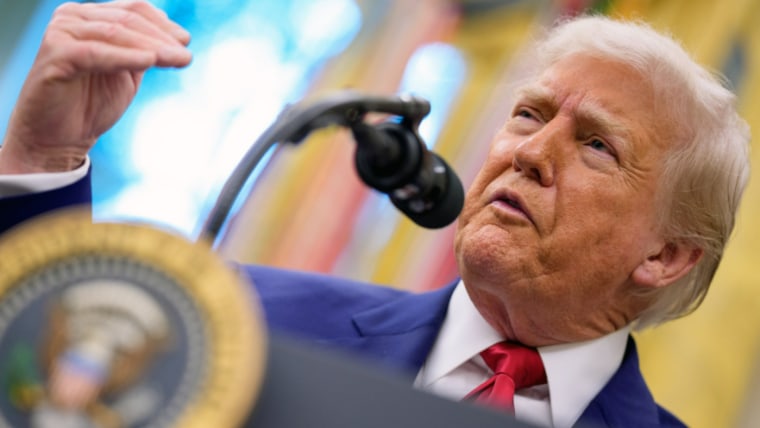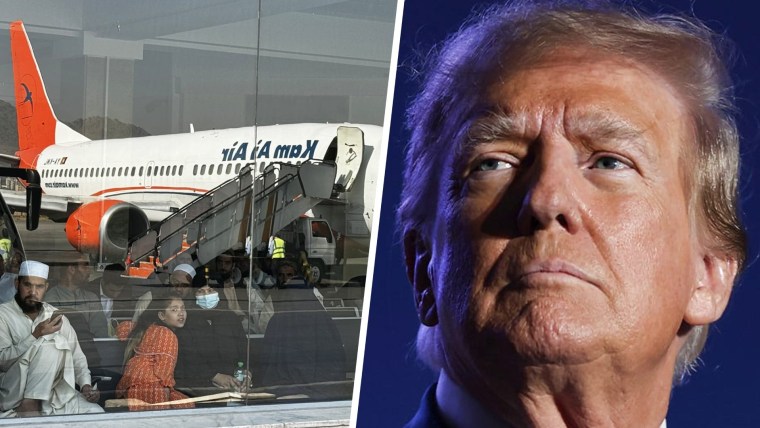UPDATE (July 2, 2025, 10 a.m. ET): A federal judge in New York on Tuesday blocked the Trump administration from ending temporary legal status for more than 500,000 Haitians who are already in the United States, some of whom have lived in the U.S. for more than a decade.
My dad, who came to Florida from Haiti in 1980, picked fruit, washed dishes and worked every job he could find before eventually becoming a professional kickboxer. My mom cleaned hotels and restaurants for 30 years, and together, my parents started businesses and built a life for our family. Their work ethic shaped everything I am.
I was born and raised in Florida, but my heart has always been split between two nations. When I boxed in the 2004 Olympics, I carried the pride of my family’s homeland into the ring and represented Haiti.
I was born and raised in Florida, but my heart has always been split between two nations.
That’s why President Donald Trump’s new travel ban, and his decision to force out Haitians who’ve recently sought refuge here, hit me so hard. It bars entry to people from 12 countries — including Haiti — and restricts others, demanding certain visas to allow travel to the U.S. For Haitians and for immigrants from mostly Muslim-majority nations, this is another chapter in a long story where immigrants are welcomed in moments of disaster before being demonized and pushed away. After the 2010 earthquake that devastated Haiti and killed tens of thousands of people, including eight members of my family, America responded with compassion. But once the cameras left, so did the empathy. Trump parroted a dehumanizing lie that Haitian migrants were bringing disease and eating cats and dogs in Springfield, Ohio.
Today, Haitians are trapped between two overlapping emergencies: political violence and climate collapse. Gangs control around 85% of the capital, Port-au-Prince, where killings surged past 5,600 people last year. Sexual violence against children has jumped by 1,000%. Meanwhile, rising temperatures, floods and hurricanes are turning entire communities into disaster zones.
On Friday, Homeland Security Secretary Kristi Noem's office announced that the federal government is ending deportation protections for Haitians who have been living in the United States under temporary protected status (TPS), consistent with an announcement in February that rescinded the Biden administration's extension of TPS for Haitians. Despite a DHS spokesperson saying that “the environmental situation in Haiti has improved enough that it is safe for Haitian citizens to return home,” Haiti, as United Nations chief António Guterres has pointed out, is not safe. Haiti may be less safe than ever, and my people are being shut out of the U.S. again.
These dual threats are pushing families from their homes, where they “[struggle] to survive in makeshift shelters while facing mounting health and protection risks,” International Organization for Migration spokesperson Kennedy Okoth Omondi said in January. This is why escaping to America is an act of survival. But instead of opening the door to those in desperate need, this administration is slamming it shut.
In fact, Trump’s policies are actively contributing to the very disasters that force people to flee. His climate negligence helps light the fire, and his immigration bans punish the ones running from the flames. That’s why groups like the Haitian Bridge Alliance, UndocuBlack Network and others are mobilizing in opposition to Trump’s new policy. We need lawmakers to act.
Passing the NO BAN Act would prevent any president from issuing broad, categorical travel bans based solely on religion or nationality. It’s a necessary guardrail — especially when bans like this one disproportionally target Muslim countries and ignore the human cost. But legislation alone won’t prevent future hate-mongers from targeting entire communities. After all, America’s recent turn toward mass deportation began with a single stroke of the pen, through Executive Order 14159. That should alarm every American who believes in due process and the rule of law. Yes, a nation must protect its people. But it’s impossible to square the expulsion of refugees and banning the entry of people from Haiti with the values America claims.
It’s impossible to square the expulsion of refugees and banning the entry of people from Haiti with the values America claims.
This is why we must ask hard questions as Americans: What kind of country do we want to be? Do we keep building walls every time we feel threatened, or do we look for ways to build bridges with people who’ve already proven their strength and loyalty? Immigrants have built this country’s railroads, tilled its fields, staffed its hospitals, coded software and, yes, won Olympic medals.
I’ve seen Haitian immigrants, in particular, engage in such hard work and in quiet acts of service. We shouldn’t rob America of the very diversity that makes it special. And we mustn’t forget that, beneath every creed, people are people and that giving qualified and vetted people a shot at the American dream is our country’s way. To keep that promise alive, we need a new generation of leaders who choose nuance over nationalism and long-term security over the passing caprice of populism.

We need policymakers with the moral clarity of Jacinda Ardern, the steady pragmatism of Angela Merkel and the climate urgency of Justin Trudeau. That leadership doesn’t have to come from Washington. In fact, around the world, grassroots groups are rising to face this challenge. Already World Relief, the evangelical refugee resettlement organization, has denounced Trump’s ban, urging the administration to “reconsider these restrictions and to pursue policies that scrutinize individuals in the interest of ensuring security without banning entire nationalities from lawfully visiting or emigrating to the United States.”
Others like Faith for Our Planet operate at the powerful intersection of environmental collapse and forced migration. Led by Sheikh Mohammad bin Abdulkarim Al-Issa of the Muslim World League, the organization trains emerging leaders to bridge climate science with faith-based teachings, empowering communities to overcome political inaction.
In May, its recently renewed flagship Duke fellowship brought together young climate advocates and faith leaders from the world’s most vulnerable nations — proving the path forward is through inclusion, not isolation. Lest we want “the land of the free” to come with an asterisk, it’s time for America to do better. End this travel ban. Fix the system. And stop treating Haitians and others like us as a threat. Immigrants aren’t here to take. They’re here to give — and they always have been.
